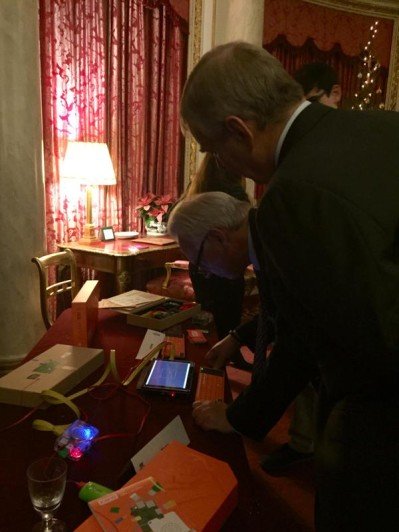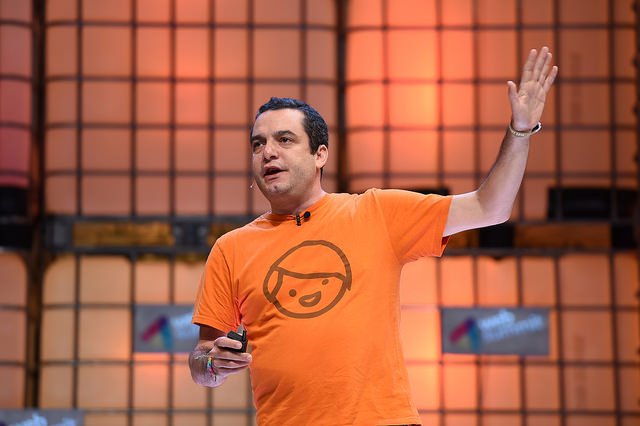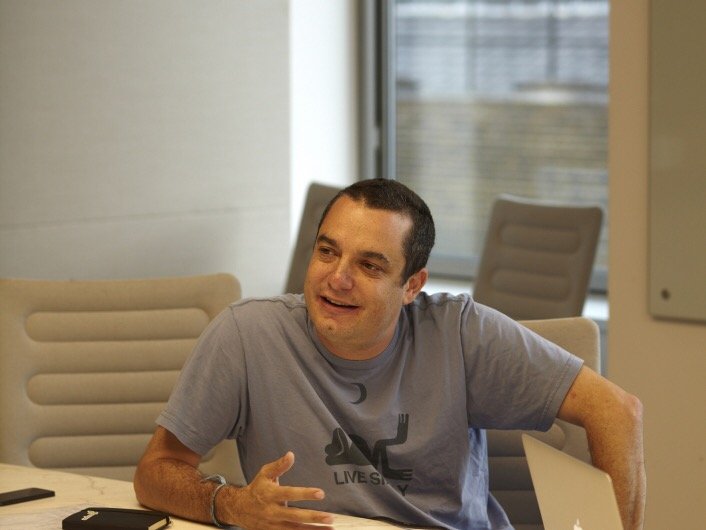tech.eu: Saul, tell us a little bit more about the reasons for leaving Index – how is what you will be doing now going to be different? You wrote in your blog post about focusing on early-stage companies, but wasn't that already a large part of what you did with Index Ventures?
Saul: There are two key differences. One is that going forward I’m going to be pretty much exclusively focused on seed. At Index, seed was a big part of what we were doing and an area that both myself and Robin helped to build out. (note: Robin Klein is Saul's father and business partner at early-stage investment fund The Accelerator Group). But as you know Index does seed, early-stage and also later-stage investments. The Index portfolio covers companies in 39 cities and 20 countries.
For me, the primary focus going forward is going to be seed and starting businesses. And also, the geographic focus its going to be seed in London. We will, by exception, look at seed opportunities in all the other places around the world where we have developed a network: Berlin, Tel Aviv, Stockholm, LA, San Francisco, New York etc. There could be interesting opportunities there, where London is a logical second or third home for us.
London has gotten to a point now where there is a volume of really, really interesting companies getting started. I mean it’s been great in the last 15 years. I think, other than the Bay Area and China, more billion-dollar companies have been born in London in the last 10 years than anywhere else. But I think it’s only just starting - actually the pace, the level of innovation, it’s just accelerating.
So my focus is really seed, it’s really London and it’s also not just about investing in these inception stage businesses. It’s also, as I’ve been able to do with Kano in the last few years, starting new businesses as well. While it’s been amazing that Index has given me the room to start new businesses in the last 8 years, Seedcamp being the first and Kano the second, it’s not a core focus for a Tier 1 venture fund.
Has Robin’s leaving been along the same intentions and focus?
Yeah, exactly. We are going to be doing effectively the same seed fund that we’ve been working on for 16 years. We are going to continue doing that but now more formally and full-time. It’s really kind of business as usual but with more focus.
Does that mean that you are going to build a somewhat larger team within The Accelerator Group?
Yeah, the plan is to build a small team to work with us. It’s a seed fund and it always was, it’ll be super focused on London and on being the first institutional investor into businesses. You know, as we’ve done over the years with Moo, Mind Candy, Transferwise, JustPark, Zoopla and others.

As a co-founder of Kano, how operational are you in terms of not just being an investor but in terms of going back to your “entrepreneurial spirit”?
Look, at least as related to Kano and to Seedcamp and to other new businesses that I’m working on, I’m always trying to do these things with other people. In the case of Seedcamp it was with Reshma, and in the case of Kano it was with Yonatan and Alex. My contribution is trying to help get the thing off the ground, help with the initial plan and product and financing and team building and as the team and as the product and company evolves, it becomes less important for me to be particularly hands-on.
Certainly the evolution of my role at Seedcamp was … In the first fund it was primarily myself and Reshma. In the second fund Carlos joined and I played a smaller role and in the third fund I played pretty much no role in terms of raising the fund. But I’m obviously still there and available to the guys and will also play a supporting role in the fourth fund.
With Kano, three years ago when we started, I was very much involved. I put Alex and Yonatan together and helped to provide funding for the first 200 kits. I introduced them to investors etc. Now it’s a company of over 30 people and they just raised a $15 million series A round. This is something that Alex, Yonatan and Tom, the COO that we hired last summer, have really been doing with my support, but I wouldn’t say that I’m operational at all. I haven’t been for at least a year or so.
I always feel like I’m trying make myself redundant.
Kano reminds us of other companies which we might call “independent hardware manufacturers” such as the Jolla phone from Finland and also Fairphone. Are you familiar with Fairphone, do you know the founder, Bas van Abel?
I don’t know him, but I know that the Fairphone is a phone that is made from like conflict-free raw materials. I’ve seen the site and read a bit about them, but I’m not quite familiar with them. Very cool concept though.
You might say “who needs another phone?” However they sold sixty thousand of them and you guys sold forty thousand or more of your kits. So do you feel there is kind of a similarity in the terms of the projects or the products being built, existing products being built in a different way with a different approach and gaining some popularity as independent companies in the same space with giant corporations?
I don’t know about the Finnish business but I think Fairphone is doing something very interesting. It’s taking a sort of, as you say, standard mass-market product and saying, people or at least some people are going to care that the raw materials are ethically sourced. You see that movement being true in food, in fashion, in make-up etc. So there is no reason why on some level there isn’t going to be a market for ethically-sourced electronics.
With Kano, actually, we are not trying to build a cheap computer…
No, of course not.
Most of the technology that we have, smartphones, tablets, computers…
In fact, the most celebrated industrial design in technology, not just Apple but Nest - a lot of it is around hardware and software - but particularly hardware - that is really closed and inaccessible. It’s all about what it does for you as a consumer and our hypothesis with Kano is that there are people around the world, potentially hundreds of millions of people around the world who want a more open, creative experience of technology and want to be able to see how technology works. They want to assemble it, they want to disassemble it, they want to remix it. It’s technology more for the skateboard generation than for the turtleneck generation!
You’ve been also investing personally in a couple of startups, aside from Index, for example Thington. You have a pretty amazing group of investors there – Eric Wahlforss, Joi Ito, Loic Le Meur, Ray Ozzie and others. How involved are you with that and how excited are you about that project?
For me, this is a good example of inception investing. What made me excited about the project was two things. One, Matt Biddulph who was the CTO at Dopplr is one of the best product people that I ever worked with. The other one was Marko Ahtisaari who was also CEO at Dopplr and went on to run design at Nokia. Marko was the angel investor who put the syndicate together. I mean, with Marko and Matt involved, I would’ve pretty much invested in anything they wanted me to.
It’s a really cool software vision of how people will take control of and interact with all of the 50 billion devices that are going to be around us in the next five years. They are not only smart people but they are fishing in a really big ocean. That kind of ticks all the boxes for me for that kind of foundation, inception-stage investing.
Any other companies that you are currently very excited about?
Well, it’s always hard to single out businesses… I’m really excited about working with Jay Bregman, the guy that started Hailo. We invested in a company that he started called Verifly which is, if you like, Verisign for drones. If you remember, as I do, ‘95 and the beginning of the Internet, people were really afraid of e-commerce because they didn’t want to give their credit cards to a Website. They didn’t know if it was Amazon or Walmart or if it was someone else. Then Verisign stepped in and created an infrastructure which allowed people to identify and authenticate third parties on the internet. And if you think about drones and the drone economy or unmanned autonomous vehicles - how do you know what that drone is, who sent it and what it does it?
For every useful application that drone is going to undertake, from aerial photography to delivering parcels, there’s going to have to be an infrastructure for identity and authentication. Again - this is an amazing entrepreneur and I think it is a huge idea. Obviously it’s incredibly early but those are the kind of things that are exciting.
Is this a personal investment or from The Accelerator Group or Index?
It’s The Accelerator Group, both of them.
In your article in the Financial Times you’ve spoken out about public policy in the UK and in Europe. Could you expand on that?
The area of policy that I have been interested in is around the policy of D5. D5 is an organization made up currently of the UK, Estonia, Israel, New Zealand and South Korea – a sort of coalition of like-minded digital technology governments who share a common vision for open data, for coding being part of the curriculum, for governments making sure at least 25% of procurement is coming from small businesses, particularly around technology, to stimulate innovation.
So, I think that is a really interesting area where governments, taking a proactive role to use the assets or the policy-making leverage or the purchasing power they have, to make data available which creates a huge amount of innovation around services. I mean, things like Citymapper couldn’t really exist without open data. Obviously I think coding being part of the curriculum is a good idea. Kano and Codecademy and others are riding that wave. The whole notion of government which is one of the biggest buyers of technology not just buying from big companies like IBM and Accenture but buying from small companies is great for startups. So all of that is really good and I’ll continue to be interested in and support that.
There is a really interesting emerging debate that’s starting to happen between public policy makers, cities and the sharing economy. I think Hillary Clinton mentioned it in a speech recently, that it’s time to start thinking about how government and the sharing economy may work and whether regulation or legislation is required.

There is a huge opportunity for policy makers and tech companies, particularly the ones that are building these mega platforms like Uber and Airbnb and others - to think much more constructively and creatively about how they can work together. Historically, both tech companies and governments have taken much more sort of an attitude of standoff to one another and I think if there was more constructive, collaborative dialogue, there could be really amazing outcomes!
Have you been actively involved with the D5 processes and discussions?
Yeah, some, because I’ve been working over the last few years as the UK / Israel tech envoy and the UK and Israel are obviously both D5 members. And then I’ve worked quite a bit with the guys in the UK. Liam Maxwell who is the UK CTO has been the driving force behind D5. So I’ve definitely been close to these discussions and really support them but I think these are the five countries right now that are really role models in different ways. Some very advanced thinking around technology and the role that it plays within society.
Images of Saul Klein and infographic courtesy of Saul Klein and Index Ventures




Would you like to write the first comment?
Login to post comments